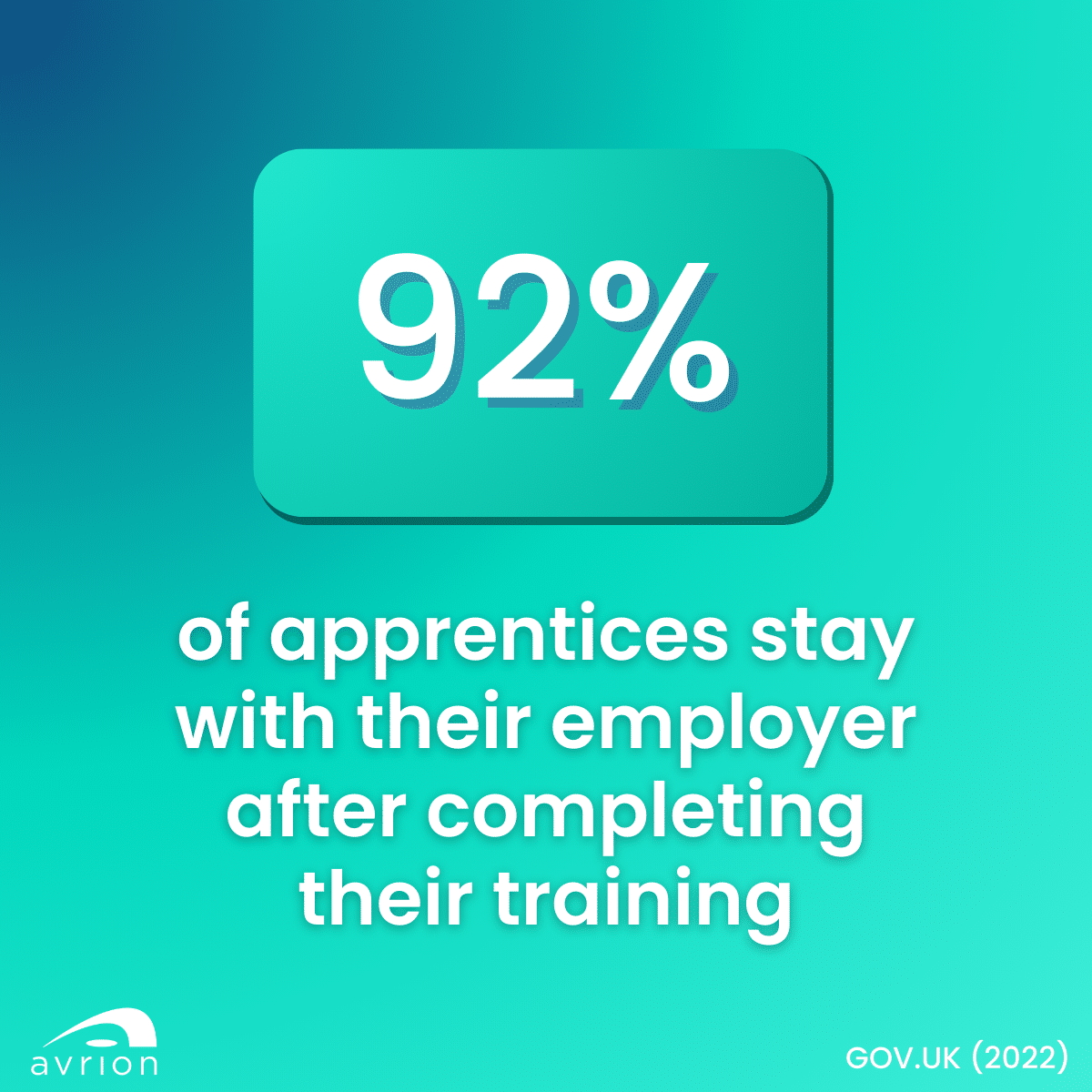Many industries are facing critical skills gaps, but instead of waiting for the perfect candidate to appear, why not train your own? One of the best decisions Avrion has made is investing in apprenticeships. Why? Because they bring fresh ideas, enthusiasm, and a hunger to learn – all essential for business growth. They also give experienced employees a way of giving back through mentoring what is often someone’s first ever job.
In the 13 years since implementing my first Apprenticeship Scheme at my then employer, through to being responsible for the apprentices at Avrion, I have recruited and managed almost 20 apprentices. Most of them have been Software Developer apprentices with a couple of Digital Marketers and one Project Manager. It fills me with pride when I look at where their careers have taken them since their apprenticeships. They have taken the opportunity afforded them by the government’s generous apprenticeship scheme and added a lot of hard work and dedication, thereby proving that university is not the only route into work. A couple of them went onto university after completing their apprenticeship and I am sure they were better equipped as a result.
So, why would a business take on an apprentice?
Tailored skills
Build the skills your business needs. With 80% “on the job” training, you can train apprentices in the exact skills your business needs. For example, the Software Developer apprenticeship covers a standard set of coding languages and methodologies, however you may have your own hybrid or bespoke way of writing code and developing software. You can expand your apprentice’s knowledge by exposing them to more approaches.
Smart investment for your business

Hiring skilled workers can be costly, but apprenticeships offer a cost-effective solution that benefits both businesses and employees through lower recruitment costs and Government funding & incentives.
Investing in an apprentice’s future means they’re more likely (but not guaranteed) to stay long-term. This is a vital component to our recruitment strategy, resulting in improved retention rates and a loyal workforce. Did you know that 92% of apprentices stay with their employer after completing their training? (Source: GOV.UK). That’s because apprenticeships create a sense of belonging, purpose, and career progression. In addition to hiring externally, we’re growing our own talent – people who truly understand our business inside and out. For us, it’s not just about filling roles – it’s about building a strong, committed workforce that drives long-term success.
Instead of competing for talent in a tight job market, why not nurture your own skilled professionals? We’ve seen first-hand how apprenticeships help reduce hiring costs and increase productivity.
ESG
Apprenticeships form part of our valued ESG responsibilities. The S stands for social issues, which apprenticeships encapsulate, enabling businesses to give back by investing time to nurture them.
Make sure you don’t take advantage of apprentices. Give them:
A fair salary
There are minimum wage guidelines that must be followed, but if you can, try to offer them a little bit more. This benefits your business by making your apprenticeship scheme more attractive to applicants, and therefore you can find someone who shares the same values as your business. Most Apprenticeship Training Providers offer a recruitment service that gets better the more you engage with them because they get to know what a successful candidate is for you.
A voice
Apprentices may be younger than other people in their field. One thing we’ve noticed since bringing apprentices into our team is that the energy and fresh thinking they bring is invaluable. They challenge us to re-think any outdated processes, embrace new technologies, and keep up with industry trends. Young talent brings even more innovative ways of thinking. In return, we offer real-world experience, structured learning, and career progression. It’s a win-win!
Recognition
Apprentices can receive less recognition for their work than skilled workers – does that sound fair? Part of the pastoral side of nurturing your apprentices is to ensure their achievements are recognised by the whole team.
Reimbursement for travel costs
Travel costs can be a challenge for apprentices. You can make work more accessible for them by subsidising or reimbursing their travel costs. For example, apprentices who need to commute to London will incur annual travel costs into the thousands. One company I worked for offered its employees an interest-free loan at the beginning of the year to purchase an annual season ticket, thereby reducing the daily travel costs. Alternatively, you could refund their parking costs. There will always be ways you can help them.
How do I find the right Apprenticeship Training Provider?
I have worked with a variety of Apprenticeship Training Providers, such as Firebrand, LearnTech and QA. It is important that you find one that aligns best with the apprentice (if you have already found one), your business and the training course.
A great place to start is GOV.UK’s employer’s guide to finding apprenticeship training. You can choose an apprenticeship training course, at the right level and skills, and then find matching training providers.
You need to consider the following:
What level apprenticeship would work best for your business?
Level 3, for example, could mean the apprentice has just completed their GCSEs, so will be around 16-17 years old, whereas Level 4 is geared more towards those with A-Levels or equivalent, so are likely to be 18-19. Having taken on both types of apprentices, it does depend on the apprentice themselves and how “worldly” they are, but in my experience, the younger the apprentice, the more pastoral support is necessary as you may need to guide them more in what is acceptable in a workplace.
You may also want an apprentice to have a certain foundation of knowledge. For example, you might need them to have Computer Science at A-level to ensure they fully understand the SOLID Principles of Programming to make code more maintainable and scalable.
What style of apprenticeship will work best for your apprentice?
Both Firebrand and QA use classroom-style training, which are either an intensive residential or a daily commute, respectively. There are merits to both. Intensive residential courses forge strong connections between the apprentices as they are socialising, as well as learning together. Commuting daily to training centres can offer an insight into a career of commuting.
The legacy of the pandemic has been a rise in the number of young people with poor mental health, social anxiety and so on, making online learning a more suitable approach. This is how we discovered LearnTech.
At the end of the day, all Apprenticeship Training Providers must follow guidelines, so the result is the same, it is just the journey that is different. You should choose the Training Provider that will work best for your business, your apprentice managers, and your apprentice.
What is in it for the apprentice?
For years, university has been seen as the “default” route to a successful career. But is it really the best option for everyone?
For many, apprenticeships offer a smarter, faster, and more hands-on way to build a career – without the student debt! Here’s why more people are choosing apprenticeships over university:
- Earn while you learn – no debt, just real wages from day one.
- Real-world experience – learn hands-on skills employers need.
- Career-ready faster – while graduates are job-hunting, you’re already working.
- Industry connections – you build a strong professional network early on.
I’ve seen first-hand how apprenticeships fast-track careers and create opportunities that university degrees don’t always guarantee. They’re not a second choice – they’re a smart choice.
What do you think? Would you choose an apprenticeship over university? Personally, if I had to start over, I would.
If you are 14-19 years old and want to find out more about apprenticeships, this is a great place to start.
Don’t apprentices take up a lot of your time?
I’m not going to lie, there is a time commitment to consider, but you need to invest in most things to gain benefits. Apprenticeships can take a year or more to complete and during that time, the apprentice’s Line Manager will need to attend progress review meetings every 6 weeks as well as providing support on a day-to-day basis.
At Avrion, sharing this commitment makes it more manageable in our busy schedules. The apprentice’s Line Manager (our Head of Development for our Software Developer apprentices) is responsible for assigning and checking any tasks, providing constructive feedback, and ensuring exposure to all the areas required by the apprenticeship.
Complementing this, the Apprentice Manager (me) is responsible for the HR and pastoral support role. They check regularly with the apprentice to find out how they are getting on with their apprenticeship and day-to-day job and answer any broad questions they may have. They also ensure the apprentice is settling into the company culture, encourage open mental health discussions, introduce them to LinkedIn and anything else that occurs.
Aren’t apprentices all school leavers?
Most people assume that apprentices are school leavers and therefore between 14 and 19 years old. However, you can also use apprenticeships to upskill your existing workforce and fill key skill gaps in your business, boost employee motivation by investing in their development, and improve retention rates.
For example, an experienced employee may be keen to get a formal qualification in their specialist area. If they have relevant prior learning, they may be able to accelerate their apprenticeship and complete it more quickly.
Or perhaps someone has the aptitude and drive to learn something new and progress into a different role? Perhaps, they want to move from Software Developer to Project Manager.
There are apprenticeships from level 2 to level 7 (equivalent to a degree), so you will be able to find apprenticeships that suit the learning and development needs of your employees.
Apprenticeships are designed by employers, so they reflect the relevant knowledge, skills, and behaviours that your business needs.
More information about apprenticeships
If you want to read more information about apprenticeships, you may find these other blogs useful:
National Apprenticeship Week: A Day in the Life of an Apprentice
Avrion’s Success Story: National Apprenticeship Week 2023
How does an Apprenticeship Work?
Digital Marketer Apprenticeship
Still want to know more? Get in touch with me and connect via LinkedIn. I’m happy to answer any questions and point you in the right direction.


